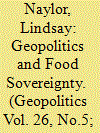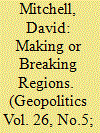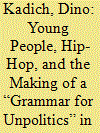|
|
|
Sort Order |
|
|
|
Items / Page
|
|
|
|
|
|
|
| Srl | Item |
| 1 |
ID:
181328


|
|
|
|
|
| Summary/Abstract |
This Forum aims to push existing debates in critical border and migration studies over the featuring of morals, ethics and rights in everyday practices relating to the governance of the mobility of non-citizen populations. Its contributors steer away from the actual evaluation or advocacy of the good/just/ethical, focusing instead on the sociological examination of morals and ethics in practice, i.e. how actors understand morally and ethically the border and migration policies they implement or resist. A proliferating interest in the discursive and non-discursive materialisation of moral and ethical elements in asylum and migration policies has examined the intertwinement of care and control logics underlying the management of refugee camps, borders and borderzones, and hotspots alongside the deployment of search-and-rescue operations. Nevertheless, recent research has shown the need to unpack narratives and actions displaying values and symbols that are not necessarily encompassed within this intertwinement of compassion and repression. We argue that there is a need to pay more attention to the diversity, plurality and the operation of morality, ethics and rights in settings and geographies, and of including a diversity of actors both across and beyond EUrope.
|
|
|
|
|
|
|
|
|
|
|
|
|
|
|
|
| 2 |
ID:
181320


|
|
|
|
|
| Summary/Abstract |
Many analysts and practitioners argue that the United States should actively engage in geoeconomic competition with China. This article suggests that an argument against this claim can be counter-intuitively derived from offensive realism – an influential international relations theory known for its pessimism on great power relations. Offensive realism suggests that a great power should try to maximize its material capacity and pay careful attention to the balance of material power between major states. It also suggests that a great power should avoid spending its limited resources in influence or legitimacy competition in the peripheries. In this context, offensive realism prescribes that the United States should not actively oppose Chinese economic initiatives unless those projects have meaningful impact on the bilateral balance of power and its security. On the contrary, Washington should encourage China to expand its investments in geoeconomic initiatives since China is likely to end up spending a large amount of its resources in regions that do not have significant implications to the balance of material power. For offensive realists, a great power should take balance of power competition in major regions seriously, not influence competition around the globe. Accordingly, the United States should restrain itself and avoid geoeconomically confronting China.
|
|
|
|
|
|
|
|
|
|
|
|
|
|
|
|
| 3 |
ID:
181327


|
|
|
|
|
| Summary/Abstract |
When Israel occupied the West Bank and the Gaza Strip in 1967, restrictions on Palestinian movement were gradually put in place. Today an intricate ‘architecture of occupation’ has been established – made up of numerous material barriers, the continuous expansion of illegal Israeli settlements on the West Bank, and the establishment of an elaborate checkpoint system. For most inhabitants of the West Bank, passing through an Israeli checkpoint is a daily ritual they cannot avoid. In this article, I analyse two car checkpoints in the Bethlehem area: The Tunnels and Al Walaja, and the experiences of the Palestinian and Jewish Israeli commuters subjected to them. I argue that these checkpoints are spaces where two different, but inherently connected, mobility regimes meet: providing Jewish settlers swift and seamless passage, while controlling and hindering Palestinian commuters. I indicate how the existence of these two mobility regimes is only possible due to the low-tech design of the checkpoints, as well as the implementation of numerous biopolitical categories by the checkpoints managers. The implementation of these biopolitical categories was experienced by my interviewees as highly arbitrary as it allows the Israeli soldiers to act ‘biopolitically on the spot’, reinstating over and over again the asymmetrical relationship between the occupier and occupied. Moreover, I analyse how Palestinian commuters employ their ‘checkpoint knowledge’ in response to this arbitrariness to try to positively influence their passages: incorporating the rules and regulations as much as possible or trying to manipulate and twist the checkpoints’ practices and biopolitical categories.
|
|
|
|
|
|
|
|
|
|
|
|
|
|
|
|
| 4 |
ID:
181314


|
|
|
|
|
| Summary/Abstract |
Thousands of affluent, white, young Americans travel overseas each year on mission trips organised by Christian churches and organisations. Like secular study-abroad and gap-year programmes, contemporary short-term missions (STMs) are informed by liberal cosmopolitan discourses that elevate affinities to ‘humanity’ and ‘the world’ above attachments to nation and locality. Also like secular overseas programmes, STMs aspire to transform young people by immersing them in ‘foreign’ places. STMs, at the same time, are motivated by a distinctively Christian ethos of ‘witness’ and self-sacrifice. Drawing on interviews with youth pastors, mission leaders and young missionaries, this article explores the ways that mission leaders encourage young Christians to engage with and to imagine their place in the world. In addition, it considers the particular contradictions presented by Christian variants of cosmopolitan discourse and practice. Missions are intended to be spiritual experiences in which young people recognise the image of God in every person, no matter how abject. Yet young missionaries learn little about the causes of the poverty they observe. By casting the missionised in the role of authentic foreigners and instruments of spiritual awakening, youth missions reproduce the exploitation that have long characterised American evangelicalism’s global engagements.
|
|
|
|
|
|
|
|
|
|
|
|
|
|
|
|
| 5 |
ID:
181313


|
|
|
|
|
| Summary/Abstract |
Whether addressing violent ethno-nationalism, xenophobic bigotry, or religious intolerance, scholars and educators invoke cosmopolitan notions of a shared planet and common humanity as a means of rising above difference. Cosmopolitanism as an ethical and political orientation places an imperative on seeking out, welcoming, and learning from cultural others. As such, cosmopolitanism involves a process of reducing the social and physical proximity between ‘them’ and ‘us’ carried out in the belief in shared commonalities held by a universal ‘we.’ However, a priori assumptions about who and what constitutes that ‘we’ at the heart of cosmopolitanism are necessarily partial, situated, and subjective. In this special section, authors consider the tensions, paradoxes, and potentials of cosmopolitanism in diverse settings and from diverse perspectives. Specifically, these papers examine the formation of youthful, cosmopolitan subjectivities and youth involvement in the creation of cosmopolitan spaces, from South-South global volunteering and international missionary trips to the anti-nationalist hip-hop scene in Sarajevo and efforts to enact a civic cosmopolitanism in Beirut. Situated in post-colonial and post-conflict contexts and centering the political subjectivities of young people and their hopeful efforts to bring about a better world, these papers examine the spatial-temporal politics of cosmopolitanism and the tension inherent in creating necessarily bounded spaces grounded in cosmopolitan openness. This introduction frames this examination of grounded and contested cosmopolitanisms as an immanent process of world-building guided by a transcendent worldviews. This framing emphasizes cosmopolitanism as a universal moral outlook and the need to create caring pluriversal worlds capable of accommodating multiple worldviews.
|
|
|
|
|
|
|
|
|
|
|
|
|
|
|
|
| 6 |
ID:
181325


|
|
|
|
|
| Summary/Abstract |
This paper explores the geopolitical imagination of the Catholic Church, particularly in relation to the former colonies of Portugal and Spain during the late imperial period (1930–1975). At that time, authoritarian dictators with strong Catholic ideology ruled both countries. However, the relationship between the Catholic missionaries and the colonial authorities of the Iberian imperial states was not always in harmony. There were sometimes contradictions between them. The geopolitics of the Catholic Church and the colonial geopolitics of the Iberian states were convergent but not always coincident. This paper describes and analyses the Spanish and Portuguese states’ policies towards the missions. It also studies the missionary discourse in the metropolis, and its impact and reflection in the colonies.
|
|
|
|
|
|
|
|
|
|
|
|
|
|
|
|
| 7 |
ID:
181321


|
|
|
|
|
| Summary/Abstract |
Ruling right-wing populist parties in Europe have significantly changed foreign policies and advanced criticism against core values of liberal democracy, including dismissive stances vis-à-vis the European Union. This paper argues that the reorientation of foreign policies in Hungary and Poland is consistent with ideas developed by incumbent populist right-wing parties and intellectuals of statecraft in the wider conservative movement supporting them. The contribution studies the foreign policy conceptions of right-wing forces and builds on critical geopolitics to trace these back to ideas shaped in broader right-wing networks that have played leading roles in developing a right-wing ideological alternative to liberalism.
|
|
|
|
|
|
|
|
|
|
|
|
|
|
|
|
| 8 |
ID:
181318


|
|
|
|
|
| Summary/Abstract |
This paper examines China’s Belt and Road Initiative as an exercise in geocultural power. To date, Belt and Road has been analysed as a geopolitical and geo-economic initiative, with arguments constructed around the development of infrastructure, trade or finance agreements. This paper introduces the Silk Roads as one of the most compelling geocultural concepts of the modern era to show its strategic value as a platform for cooperation and multi-sector connectivity. A critical analysis of the Silk Roads provides new insights into Belt and Road, revealing how China is mobilising its geocultural potential as a civilisational state to build regional and continental connectivities.
|
|
|
|
|
|
|
|
|
|
|
|
|
|
|
|
| 9 |
ID:
181326


|
|
|
|
|
| Summary/Abstract |
The everyday practice of food sovereignty varies across place, and efforts to democratize food systems and create more holistic and equitable forms of food production and access are highly politicized. Considering the “geo” of these practices assists with understanding how perceptions of place shape imaginaries about food sovereignty in place. Using the example of education-based food sovereignty tourism in Cuba I examine, in this paper, how outsiders from the US map geopolitical imaginaries onto Cuba in their efforts to see the “real Cuba” and authentic food sovereignty practices. I argue that the myopic character of food sovereignty tours creates a re-writing of space based on participants’ hopes and fears regarding agricultural production and consumption. Drawing on a feminist geopolitical framing, I use recent theorizations that consider geopolitical encounters via tourism to elucidate what I observed, which trended towards paternalistic geopolitical imaginaries of Cuba.
|
|
|
|
|
|
|
|
|
|
|
|
|
|
|
|
| 10 |
ID:
181319


|
|
|
|
|
| Summary/Abstract |
China’s Belt and Road Initiative (BRI) has gained worldwide attention, as the government of Xi Jinping has committed itself to globe the spanning connectivity project. Global in scope, the role of regions and regional organisations has been identified as being important elements in bringing the BRI to fruition, even though its execution has been based on bilateral agreements. This is true in those regions, notably South Asia, Southeast Asia and the Indian Ocean that are central to the BRI’s immediate development and early recipients of substantial investment. This raises the question of what type of influence the BRI will have on these regional groupings. Drawing on the concept of ‘regionness’ developed by Hettne and Söderbaum, this study assesses how the aforementioned regions are affected by their respective states’ participation in the BRI. Each case will assess changes in institutions, transnational linkages and development of shared identity of each region. Regional change in these areas is highly contingent, it is found that an alternation of the ‘regionnness’ is most likely in the case of South Asia and the Indian Ocean.
|
|
|
|
|
|
|
|
|
|
|
|
|
|
|
|
| 11 |
ID:
181322


|
|
|
|
|
| Summary/Abstract |
Prevailing theories of fascism reject the proposition that fascism offers a distinct outlook on political economy. Contemporary fascist political parties, I argue, belie this claim. Neofascism has constructed a distinct approach to political economy in response to a unique circumstance: fighting for power in parliamentary democracies whose histories include the overcoming of democracy by fascists. Understanding fascist political economy mean re-conceiving it as an every-day practice of movement building. I use Greece’s Golden Dawn as a case study. Making use of a previously untapped resource – the Golden’s Dawn’s regularly published on-line newspaper – I show how the party connected its organizing activities with its ideology during its 2012–2014 ascendance. The article sets an agenda for studying twenty-first century neofascism in democratic countries: movement-building by connecting economic sovereignty in theory to every-day forms of political practice.
|
|
|
|
|
|
|
|
|
|
|
|
|
|
|
|
| 12 |
ID:
181317


|
|
|
|
|
| Summary/Abstract |
In this paper we use assemblage thinking to offer a new interrogation of the relationalities of volunteering and development and to revisit volunteering’s relationship to cosmopolitanism. Recent debates about the rise of new actors in development cooperation have seen a growing interest in the geopolitical significance of volunteers and their contribution to development. Research has addressed the ways international volunteering can shape cosmopolitan subjectivities, whilst claims for volunteering’s universality are a key feature of global development policy. However, we argue that existing approaches to volunteering, cosmopolitanism and development remain contained by established development imaginaries and their ascription of agency, authority and expertise to actors from the global North. We use the idea of the assemblage, and data from two research projects, the International Federation of Red Cross and Red Crescent’s (IFRC) Global Review on Volunteering, and a doctoral research project on diaspora volunteering, to explore the constitution of what volunteering is within and between places. Through this, we identify alternative sites for interrogating the capacity of volunteering to challenge established ideas of agency, care and responsibility in development.
|
|
|
|
|
|
|
|
|
|
|
|
|
|
|
|
| 13 |
ID:
181316


|
|
|
|
|
| Summary/Abstract |
By resorting to a single humanity or global citizenship, civil society organisations in Lebanon seek to raise youth above ethno-national and national differences. Youth from different groups, regions or nationalities are pulled-out of their respective milieus and gathered in spaces where they meet, befriend, train and collaborate. While for the duration of workshops and summer camps youth find themselves in a space removed from the many divisions and inequalities so as to see in each other a “shared humanity”, they still need to confront those divisions and inequalities that order their everyday lives when they return. In navigating the many contradictions between their lives and the NGO space, sectarianism and global citizenship, young men and women in Lebanon try to carve out a space from which they can engage with the world. By drawing on the notion of cosmopolitics as the extent of one’s “world” tied to the political claims one makes in relation to others, this paper will explore how a cosmopolitics of citizenship brings into the fore the politics of global citizenship and its promotion in Lebanon.
|
|
|
|
|
|
|
|
|
|
|
|
|
|
|
|
| 14 |
ID:
181324


|
|
|
|
|
| Summary/Abstract |
As the importance of natural gas for the energy future of the European Union rises, many new pipeline projects are proposed to transfer rich resources of Eurasia towards Europe. Why do some of these projects succeed, and others fail? To explain this phenomenon, the energy security literature has focused mostly on the security of energy supply and demand, while the specific challenges faced by transit states attracted relatively less attention. This paper focuses on the reasons that make pipeline politics and economics controversial and challenging by introducing and operationalizing the concept of transit security. It defines transit security broadly where transit countries are sensible to changes in supply and demand in addition to pipeline-specific issues, which are determined by a combination of economic and geopolitical factors. It argues that in the case of Turkey, transit security is influenced by asymmetries in trade dependence and political power in addition to prospect of future rents from transit. The last section applies this framework to Eurasian gas transit in order to explain the success and failure of past, present, and future pipelines.
|
|
|
|
|
|
|
|
|
|
|
|
|
|
|
|
| 15 |
ID:
181323


|
|
|
|
|
| Summary/Abstract |
This paper discusses uses and misuses of EU border management models and strategies in the framework of crisis response interventions in the Southern and Eastern neighbourhoods. It focuses especially on Libya and Ukraine, cases which dramatically stand out as the conflicts at the gates of Europe. The deployment of border management instruments appears to follow different trajectories in the two countries, diverging in terms of both design and implementation. By relying on collaborative research materials resulting from extensive fieldwork, the paper argues that the differentiation of EU’s interventions across the ENP countries can be explained as the result of growing political and institutional fragmentation in the EU, the replacement of the “transformative power”-mantra with new stabilization templates and weak strategic consistency among member states, each conveying different security identities and interests vis-à-vis EU’s external actions and sectors. Primary data, collected between 2016 and 2018, does not point to an increase in conflict-sensitivity, context-specificity and local ownership, they rather reveal the crisis of the EU´s liberal project.
|
|
|
|
|
|
|
|
|
|
|
|
|
|
|
|
| 16 |
ID:
181315


|
|
|
|
|
| Summary/Abstract |
This article investigates youth political subjectivity and subject formation in the context of postsocialist transition and projects of post-conflict peace-building in Sarajevo, Bosnia and Herzegovina. Following a youth subculture, it explores how nationalist visions of the future, the geopolitics of partition, and the very notion of ethnic identification itself are unwound and contested through embodied, affective geopolitical engagements in a hip-hop public. Drawing on feminist political geography, the article argues for scholarly understandings of young people’s lives as constituted by and constituting everyday geopolitical realities. In doing so, it calls for scholarly attention to the ways in which youth, in the course of turning away from dominant institutions, practice illegible forms of politics. To that end, the article tracks how these young people used hip-hop to cultivate a “grammar for unpolitics” centred around the urban as an ethics and category of belonging that fostered forms of mutuality radically alter to dominant notions of identity. These unpolitical engagements, the article argues, appropriate and subvert larger political discourses such as violence and victimhood, creating spaces for politics outside of the ethno-national problematic.
|
|
|
|
|
|
|
|
|
|
|
|
|
|
|
|
|
|
|
|
|